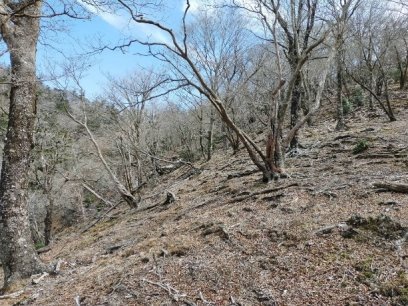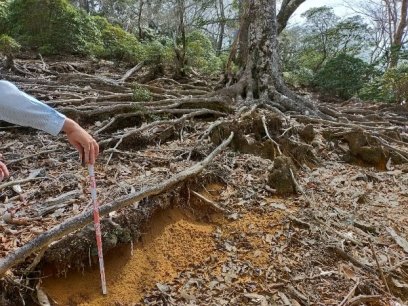Assistant Professor Katayama and her research group found that beech trees are declining due to soil erosion caused by an increase in the number of deer in Shiiba's back woods.
*The following sentences are translated by the automatic translation function.
POINT
- In recent years, increasing deer populations have been foraging and reducing forest understory vegetation, resulting in soil erosion in mountain forests in Kyushu. However, it was not known how this kind of soil erosion would affect the growth of the trees.
- In the Miyazaki Experiment Forest (Shiiba-mura) of Kyushu University, where a mountain beech forest extends, we investigated the relationship between the degree of root exposure, an indicator of soil erosion, and the growth of beech trees and found that the larger the root exposure, the lower the growth of the beech trees.
- The results of this study showed for the first time that the increasing vegetation loss in Japanese forests is caused by the slowing down of the vegetation by deer.
SUMMARY
In recent years, the vegetation in the understory of many natural forests in Japan has decreased due to feeding by the increasing population of Japanese deer. The loss of understory vegetation accelerates soil erosion and exposes the roots of the trees to the ground, but the effect of soil erosion caused by the loss of understory vegetation on the growth of the trees has not been clear until now. A research group led by Hayato Abe, a graduate student at Kyushu University's Graduate School of Bioresource and Bioenvironmental Science, Assistant Professor Ayumi Saito of Kyushu University's Graduate School of Agriculture, and Professor Fusanio Hyodo of the Okazaki University Graduate School of Science's Department of Environmental Biology and Life Science investigated the relationship between soil erosion and tree growth in a southern Kyushu beech forest where deer have been foraging on the vegetation for a long period. The results showed that soil erosion was a major factor in the growth of beech trees. The results showed that beech with more exposed root systems, an indicator of soil erosion, had lower annual leaf litter and trunk growth. Annual ring analysis revealed that the decline in beech growth occurred during a period of increased deer population and reduced or eliminated understory vegetation in the area. Analysis of carbon stable isotopes in the annual ring samples revealed that the decline in growth may have been caused by water shortages due to root exposure. The decline in beech tree growth may be linked to a decrease in leaf litter and fallen branches, which cover the ground and reduce soil erosion, creating a negative spiral that leads to further soil erosion and a decline in beech tree growth. The decline in the growth of forest component trees may lead to future forest degradation and devastation, and the results of this study show the need to control excessive vegetation feeding by deer in order to conserve natural forests and maintain ecosystem services.
The results of this study were published online in the international journal "Catena" on October 11, 2023.


Comments
Deer vegetation has been increasing in recent years in forests throughout Japan. If intense vegetation grazing by deer adversely affects the function of the forest ecosystem, appropriate deer management is required. However, basic information on how intense vegetation feeding affects the function of the forest ecosystem and where it is most likely to be severe is still lacking. This study shows that unless the deer are in a full-loaded forest, they can reduce the growth of beech trees in mountain forests. Our team will continue to study the impact of diet on forest ecosystems and evaluate the conservation benefits of deer control measures.
Research-related inquiries
Katayama Ayumi,Assistant Professor
Faculty of Agriculture,Department of Bioresource Sciences












 Contact
Contact
 Access Map
Access Map

